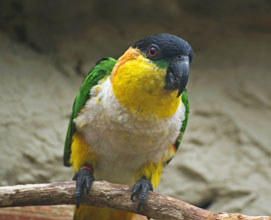
Different parrots have different nutritional needs. Cockatiels like seeds, lorikeets like nectar. In the wild, caiques eat flowers, which may explain why they prefer brightly colored pellets. Some enthusiasts say that the birds will even have favorite colors, perhaps picking out the green ones and leaving the purple ones behind.
Caiques also like sweet food, so before buying a whole sack of pellets, sample the different brands to check which one has better flavor. Don’t worry: all formulated pellets are designed to provide 100% of the bird’s nutritional needs.
That’s why you don’t have to give any additional vitamins, unless recommended by a veterinarian.
However, you should try to give your pet fruits, vegetables and a few seeds, if only to introduce a little variety to its diet. How would you feel if you ate nothing but cereal for your whole life? Avoid giving too much sunflower seed, which contains a high amount of fat, and never give any seed designed for wild birds. The best choice is a fortified seed mix. Experts say that seeds should only account for 10% of your caique’s diet.
Wild caiques are used to eating nectar. You can try buying nectar mixes, usually sold for lorikeets or lories, or make your own. Try combining 5% dextrose wit 5% fructose, or experiment with the adult milk or energy drinks like Ensure or Sustical. For some reason, the birds like the flavor and consistency. Other options recommend by enthusiasts: ginger ale, cranberry juice, or any fruit juice. Serve this in the morning and throw away any leftovers by the end of the day.
Caiques Food-Meal routines
Birds never binge on pellets, so you can leave enough in the bowl to last the whole day. Refill the bowl as needed. Though pellets will stay “fresh” for several days, do replace with a fresh batch every week. You should also discard any pellets that have become damp, infected with feces, or mixed with other foods.
Since wild caiques forage for fruits and vegetables in the morning, serve your “salads” at the start of the day, but remove by dusk. Chop the pieces or run them through the blender. This can prevent picky eaters from avoiding the parts they don’t like, thus guaranteeing a more balanced diet.
Caiques Food-Toxins
Never serve your caiques honey, which can contain clostridium botulinum (birds are particularly vulnerable to botulism). Other no-nos are coffee, chocolate, apple seeds, and peach pits.